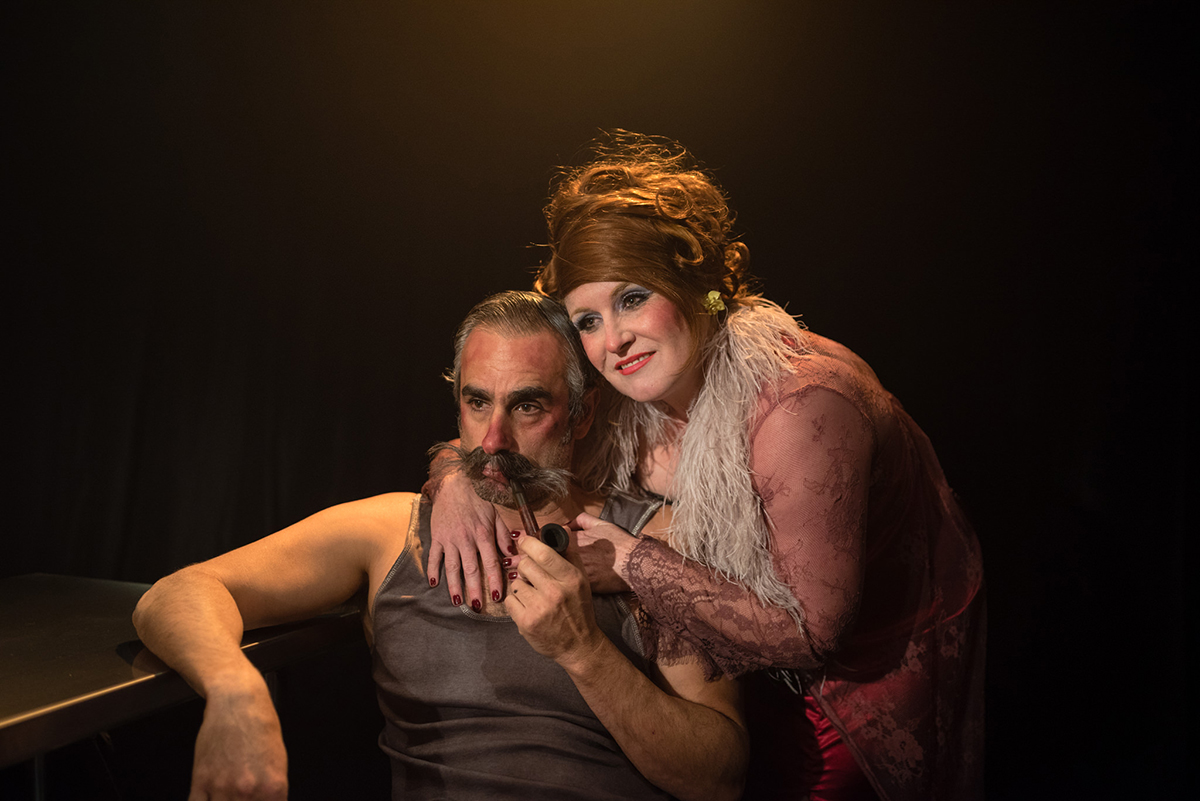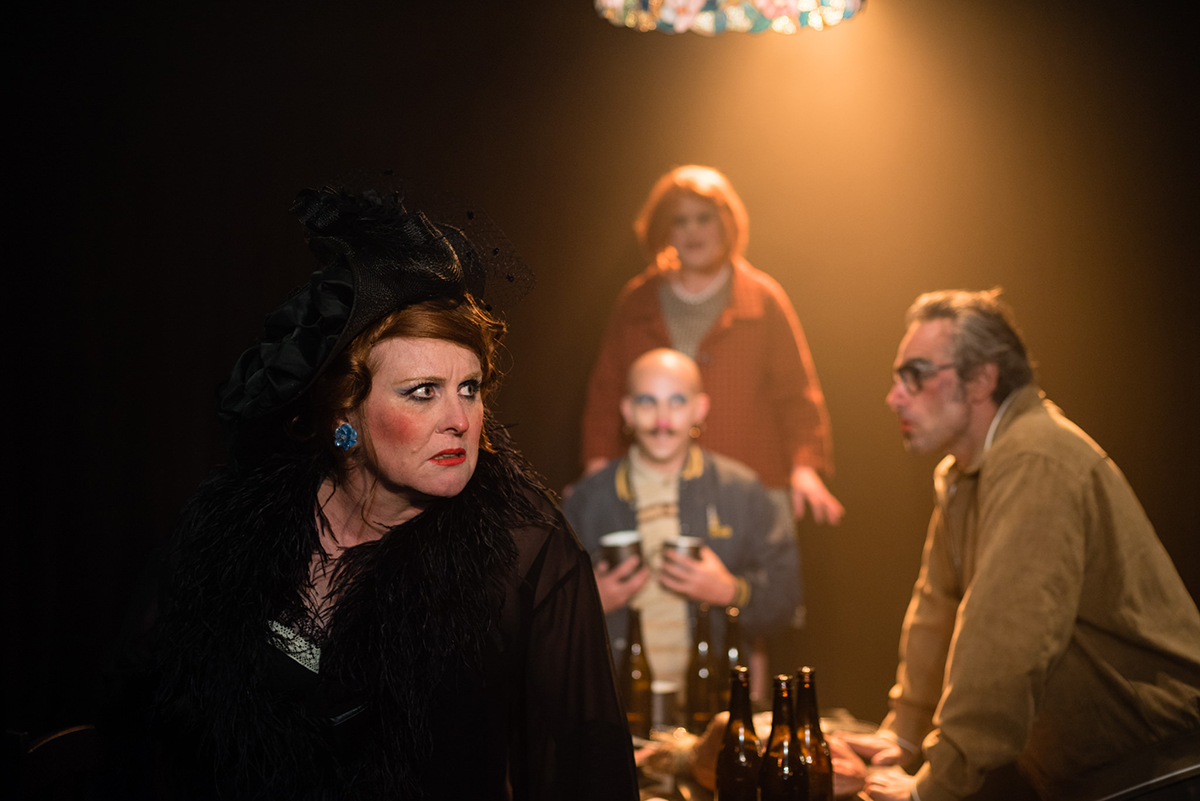
The Ham Funeral: Mrs Lusty’s tragedy
It was eerie to be at The Stables and find myself once again in the grip of the poetry, grotesquery and tragedy of Patrick White’s The Ham Funeral (1948). I’d been entranced and haunted by the 1989 Sydney Theatre Company production and a subsequent ABC TV broadcast, which I’d recorded at the time and watched again recently.
If Neil Armfield’s STC account was hyper-Edwardian Gothic (the coifs of the four stiffly suited, male relatives recalling Split Enz), replete with Alan John’s organ score, Kate Gaul’s production for her Siren Theatre Co is contemporary casual (the Two Ladies — one of them cross-dressing — are Mardi Gras leftovers in chunky heels and sneakers), although the costuming for the play’s central figures, the Young Man and Alma Lusty, hints at an earlier period and a certain timelessness. Instead of a windowless basement, Gaul and designer Jasmine Christie have created a nightmarish dream space — a shiny, black floor thrusts forward from a semi-circle of heavy, dimly lit curtains, suggesting unusual depth for the small Stables stage and exploited in the Young Man’s appalling near strangulation of Alma at the play’s climax.

Cast, The Ham Funeral, Siren Theatre Co and Griffin Independent, photo Lucy Parakhina
One of the relatives at Will Lusty’s wake grandly declares that the boarding house, which Will and wife Alma have run from their basement, once filled and strained with the former wrestler’s breathing. Nate Edmondson’s enveloping sound design conjures that creaking and grinding like a haunting, with distant melodies floating by and the sudden presence of a ticking clock. Alma too listens, hearing the damp and the furniture.
There was a widespread belief in the 60s and 70s that White’s Young Man in his role as character-cum-commentator (“It might not be your kind of play. There’ll be no refund.”), the music hall banter of the The Two Ladies and the vicious choral teamwork of the Four Relatives were out of kilter with naturalism. Worse, the apparent alternation between conversational and poetic dialogue was deemed unmanageable. However, postmodernism’s openness to formal complexity and the brilliance of directors and actors who have trust in the cogency of White’s language, as they might Shakespeare’s or Beckett’s, have granted the plays the success they deserve. What’s critical in The Ham Funeral is that the Young Man is indeed a poet and that he is entranced when Alma and Will unconsciously wax lyrical, glimpsing something profound in people he finds otherwise repulsive. Reflecting later on a sudden outburst from Will (Johnny Nasser), the Young Man declares, “I almost loved him.” We are alert to that poetry before the Young Man (Sebastian Robinson) is. With blowsy relish, Liz Logan delivers Mrs Lusty’s sensual recall of coming out of the theatre after rain and delighting in blossoms, or smelling beer and soap on her young husband, or remembering sex on damp grass: “we was burnt up.”
Early on, the Young Man admits to suffering “the poet’s tragedy” — knowing too much and never enough. What he doesn’t know is that he’s walked into a real tragedy, Alma Lusty’s, and is in danger of becoming part of it. Robinson plays the poet’s naivety and disdain with an eloquent smugness. He’s ill-prepared to face two deaths (Will’s heart attack and a foetus found in a rubbish bin by the scavenging Two Ladies) and for falling into the roles of Jack, Alma’s dead child, and Fred, the child’s father and Alma’s one-time lover. Alma transforms the Young Man into these figures at times consciously and at others as if she’s lost in a dream, Logan deftly traversing the transitions, while Robinson captures the escalating attraction-repulsion in the wild game-playing and final embrace with Alma.

Sebastian Robinson, The Ham Funeral, Siren Theatre Co and Griffin Independent, photo Lucy Parakhina
Spending much of his time in bed, The Young Man, until invited downstairs is dangerously like Will in his stillness. And like Mrs Lusty, he conjures another reality, transforming an unseen neighbour, Phyllis Pither (Jenny Wu, aetherial at first, then probing), into a ghostly presence with whom he longs to merge. He has in fact unleashed his suppressed superego, which ultimately cannot be ignored, forcing him to admit to himself his cruelty to Mrs Lusty and to acknowledge her simplicity and innocence. He can then leave the boarding house and the fantasy Phyllis. Mrs Lusty, however, cannot.
The emotional power of The Ham Funeral resides in Alma Lusty, in her frustrated attempts to draw Will out of his silence, the eagerness with which she invites the Young Man to socialise and to become the loved figures she has lost, her shock at Will’s death (alarm, distraction, reflection spilling out in quick succession) and the determination to provide a ham for Will’s wake (neighbours had only faggots or a leg of mutton), with which to impress his relatives. She is endowed with acute self awareness about her appearance, her moral failures, the instability of her fantasy life, and yet she is brutally punished for them. The relatives aggrandise Will’s character and declare her, in effect, his murderer (“the goodness in him turned to pus”). Kate Gaul deploys the accusing guests in a series of grotesque tableaux, hovering around Alma and clustered on and under the table. And as if to prove their point, Logan’s ever sensual Alma finds her way onto the lap of one them.

Foreground: Eliza Logan, Johnny Nasser, The Ham Funeral, Siren Theatre Co and Griffin Independent, photo Lucy Parakhina
Once the delirious Alma has turned her attention to the Young Man, after he has banished the guests and finds himself playing Jack and Fred, he cruelly confronts her with what he sees as inner ugliness, just as Alma thought Will could look through her skin. The Young Man’s sudden strangling of Alma is profoundly shocking in its twisted motivation and in the intense duration of its staging, bringing home all the poet’s inadequacies and inexperience, above all his deep fear of women. Alma survives, but her tragedy is agonisingly felt, “What have I done to be shut up in this body and no-one to let me out?” The utterance wracks Logan’s Alma. She has been condemned for feeling (“You bitch…you can still feel,” yells Will prior to slapping her), for having memories and for her physical sensuality, which is emphatic in Logan’s performance. Just how Alma will go on is uncertain, but with Will, the Young Man and the Relatives gone, she might be just able to let go of her ghosts.
Kate Gaul’s fine direction is tensely paced and the insistent dark humour well-calibrated as tragedy looms. The ensemble playing is strong with Logan, Robinson and Jack Nasser — as the fearsome, stony baritone Will and then a high-pitched insinuating relative — providing the performance’s centre of gravity. This modest, intensely intimate production is another that reveals the enduring power of The Ham Funeral.
–
Siren Theatre Co & Griffin Independent, The Ham Funeral, writer Patrick White, producer, director Kate Gaul, performers Andy Dexterity, Eliza Logan, Carmen Lysiak, Johnny Nasser, Jane Phegan, Sebastian Robinson, Jenny Wu, designer Jasmine Christie, lighting designer Hartley T A Kemp, composer, sound designer Nate Edmondson; SBW Stables, Sydney, 17 May-10 June
Top image credit: Johnny Nasser, Eliza Logan, The Ham Funeral, Siren Theatre Co and Griffin Independent, photo Lucy Parakhina






